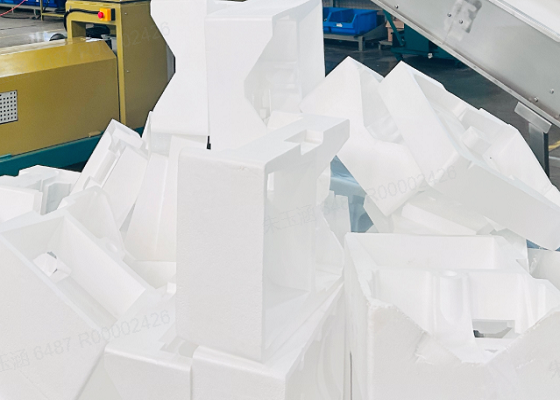Circular Energy helps supply EPS melting machine and successfully recycles home appliance packaging in South Africa
According to Patricia Schroder, CEO of Circular Energy, recycling technologies and practices are more prominent than ever in a time when sustainability is at the top of everyone's mind. Waste problems, particularly those involving lightweight but bulky materials like expanded polystyrene (EPS), have spurred creative partnerships and solutions in sectors that frequently use these materials. For example, Circular Energy and LG Electronics have partnered to address the recycling issues of EPS waste in South Africa.

In daily life, the furniture and home appliance industry can be said to be the main industry that produces waste EPS. The common TVs, refrigerators, washing machines, wardrobes, etc. in our daily life should be careful not to be violently collided during transportation, otherwise it will cause serious economic losses. The characteristic of these EPS packaging is that they are large, larger than the EPS fish boxes and EPS fruit and vegetable boxes in daily life, and more difficult to transport, but we are not helpless about this. For example, Circular Energy provides EPS recycling equipment for RevoWaste, which is responsible for the waste collection of LG and many other companies. The machine is expected to greatly improve efficiency by converting EPS into a more compact form suitable for transportation.
.jpg)
In the process of using the EPS recycling machine, huge value can be created. The huge EPS waste can be compressed and reused to make plastic particles. RevoWaste recycles a large amount of polystyrene every year—about enough to fill three Ellis Park stadiums. These polystyrene are melted and prepared for use by companies such as Supreme Mouldings, which transform them into beautiful decorations such as skirting boards, wall panels, picture frames and decorative lines. In fact, this business model is not uncommon. GREEMAX is also practicing this business model and even using its own advantages to form a more compact closed loop.The reason for this is that GREENMAX, as a subsidiary of INTCO Recycling, designs and manufactures EPS melting machines. After customers use the EPS melting machine to process waste, the compressed waste will be purchased by INTCO Recycling. Because we have a production workshop for manufacturing new plastic products, we can achieve a complete recycling closed loop.

